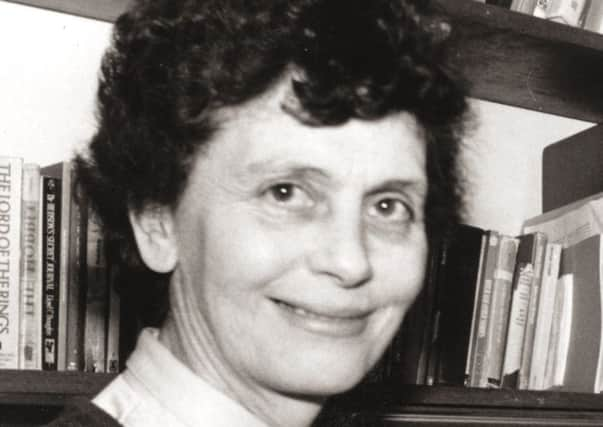Obituary: Dr Catriona Stewart Collins, teacher who carried out pioneering work in field of dyslexia


Dr Catriona Collins will be remembered for her pioneering work in the teaching of young people with learning difficulties, particularly in the field of dyslexia, and for her drive, energy, generosity and humanity.
Born in London and raised by two aunts during the period of the blitz bombings by German planes in the Second World War, Dr Collins had personal experience of a disrupted education. She gravitated towards working with children and in the fifties, aged just 21, she was a teacher in charge of maths and English at Leavesden School (now closed) in Watford, north of London. She then gained experience of teaching primary aged pupils at the nearby Town School.
Advertisement
Hide AdAdvertisement
Hide AdIn the sixties her family moved to Edinburgh and from 1965 she was employed as a teacher in the primary school of George Watson’s College. In 1972 she became a specialist remedial teacher and by 1979 was appointed Principal Teacher of Remedial Education based in the secondary school.
Around that time remedial education was often viewed as a service for children who were not very bright. At Watson’s Catriona recognised there were pupils who were intelligent and articulate but who had difficulties with reading and writing. Attending a conference in London she learned about “word blindness” and the importance of testing to provide an accurate diagnosis. She then persuaded her Principal, the now late Sir Roger Young, to let her to set up a remedial class of pupils who received her dedicated support at the times they were withdrawn from regular classes.
Meanwhile on an annual basis a quota of six pupils who had been diagnosed as dyslexic by an educational psychologist and who might not otherwise pass the necessary entrance assessments were admitted to the school.
Catriona identified a space within Watson’s bustling secondary school where she could create a quiet, safe environment free from distractions for her pupils. Rather inauspiciously this space – nicknamed the Cabin – was under the stage of the main assembly hall. In preparation for a visit from the Queen in 1982 however the “Cabin” was reallocated to a suite of rooms in a main east corridor.
As Catriona wrote for a school publication of 2006 “The philosophy was simple: each pupil was seen as an individual who had the ability to reach his intellectual and educational potential. It was a paramount importance to discern pupils’ strengths and build confidence sufficiently to tackle the English language.”
It was a philosophy that created a generation of pupils inspired to cope with and overcome their learning difficulties so that they did not present a barrier to them going on to achieve in many different professional fields.
Catriona disseminated her expertise through talks and advice, often giving of her professional services free of charge. She also introduced a one-year part-time course leading to the Royal Society of Arts Diploma Qualification in the Study of Dyslexia. She herself pursued her own professional development, gaining a raft of postgraduate qualifications.
She achieved recognition in 1976 through the William Y Darling Bequest for Good Citizenship awarded by Edinburgh District Council for her “voluntary work and devotion in helping children in Edinburgh and throughout Scotland who suffer from dyslexia (word blindness) and in particular in her capacity as adviser to the Teaching Unit of the Scottish Association for the Study of Dyslexia”.
Advertisement
Hide AdAdvertisement
Hide AdThen in 1977 a Thyne Scholarship awarded by the English Speaking Union of Scotland facilitated a study trip to the USA which helped to further deepen her understanding of working with pupils with specific learning difficulties.
Sir Roger had recognised the unique selling proposition Catriona and her Cabin provided Watson’s. However, after his retiral in 1985 the winds of change blew in. Moves in the educational world were towards a more integrated form of supported education. Friction between Catriona and Sir Roger’s successor, Frank Gerstenberg, led to Catriona parting company with the school at the end of the school session in July 1994 when she was 59 years old. The school recorded her as having taken “early retirement” Retired? Not Catriona Collins. She was now merely released to spread her expertise in a wider arena.
From 1994 to 1996 as a part-time lecturer at Napier University she managed a Masters Course in specific learning difficulties. Between 1996 to 2006 she taught on a part-time basis at Fettes College as its Mistress in Charge of Learning Support. She also provided her professional services to the British Army assessing personnel for specific learning difficulties. From 2004 to 2013 she was a Governor of Dunedin School – a small private secondary school in Edinburgh for pupils unable to manage the rigours of mainstream education.
Catriona also contributed to the formulation of national policy through serving on the Scottish Parliament’s Cross Party Group on Dyslexia at a time when it was pushing to ensure an equity of provision within local education authorities; for compulsory initial teacher training and continuous professional development in dyslexia awareness.
Busy as she was, for over 30 years from the 1980s onwards, Catriona found time to volunteer at St Columba’s Hospice in Edinburgh where she could to dispense her much valued person-centred care and empathy.
KAY SMITH